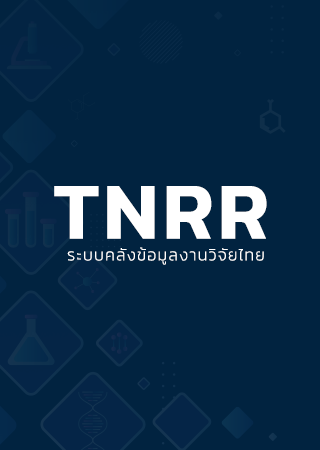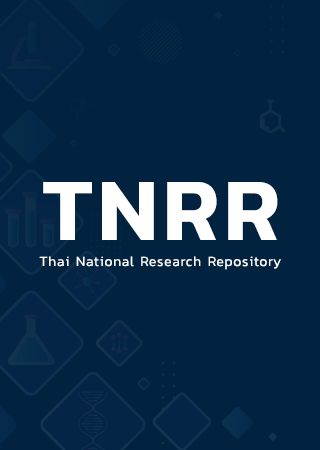Description
การวิจัยมีวัตถุประสงค์ เพื่อ (1) สำรวจความคิดเห็นของประชาชนเกี่ยวกับการป้องกันและแก้ไขปัญหาการแพร่ระบาดของโรคโควิด-19 (2) ติดตามพฤติกรรมการใช้ชีวิต การปรับตัว ความวิตกกังวล และการเรียนรู้ของประชาชน (3) พัฒนากระบวนการสร้างการเรียนรู้ในการปรับตัวของชุมชนวิถีใหม่ (4) หาแนวทางการวางมาตรการป้องกันร่วมกันระหว่างมหาวิทยาลัยราชภัฏและหน่วยงานที่เกี่ยวข้องในพื้นที่ กลุ่มตัวอย่างที่ใช้ ได้แก่ประชาชนทั่วประเทศ หัวหน้าครัวเรือน จำนวน 31,394 ครัวเรือนที่ได้มาจากการสุ่มตัวอย่าง และผู้มีส่วนเกี่ยวข้องในทุกจังหวัด จังหวัดละ 20-30 คน เครื่องมือที่ใช้ คือ แบบสำรวจ แบบสอบถาม แบบสัมภาษณ์ วิเคราะห์ข้อมูลโดยการแจกแจงความถี่ ร้อยละ และการวิเคราะห์เนื้อหา ผลการวิจัยได้ดำเนินการสำรวจความคิดเห็นจากประชาชน (Polls) จำนวน 8 เรื่อง และการสำรวจจากครัวเรือน พบว่าประชาชนมีรายได้ลดลง การจับจ่ายใช้สอยลดลง และมีเงินออมลดลง ในขณะที่มีดูแลสุขภาพและป้องกันการติดเชื้อมากขึ้น มีความวิตกมากขึ้น ความสัมพันธ์ในครอบครัวและในชุมชนปกติ แต่การทำกิจกรรมในชุมชนลดลง มีการใช้อุปกรณ์เทคโนโลยีมากขึ้นแตกต่างกันตามกลุ่มอายุและมีปัญหาสุขภาพจากการใช้เทคโนโลยี เด็กเรียนออนไลน์มากขึ้น ผู้ปกครองมีค่าใช้จ่ายเพิ่มมากขึ้น ประชาชนปรับตัวด้วยการลดค่าใช้จ่าย วางแผนการใช้เงินและวางแผนการประกอบอาชีพ มีการจัดการพื้นที่สาธารณะและปฏิบัติตามมาตรของรัฐ ใช้มือถือและสื่อสังคมออนไลน์ทั้งการรักษาความสัมพันธ์ในครอบครัว การเข้าร่วมโครงการของรัฐ การติดตามข้อมูลข่าวสารและการเรียน ทั้งนี้ชุมชนมีแนวปฏิบัติที่ดีในการปรับตัวสู่ชุมชนวิถีในทุกด้านและมีนวัตกรรมด้านเทคโนโลยีสารสนเทศ รูปแบบสื่อที่ถูกพัฒนาโดยใช้กระบวนการมีส่วนร่วมของหน่วยงานที่เกี่ยวข้องมี 2 รูปแบบ คือ สื่อสร้างความเชื่อมั่นต่อเศรษฐกิจในระดับชุมชน และสื่อให้ความรู้ด้านการป้องกันตนเองในสถานการณ์การระบาดของโรคโควิค-19 จำนวน 77 รายการ ส่วนใหญ่เป็นคลิปวีดีโอและใช้ช่องทางการสื่อสารออนไลน์มากที่สุด ข้อเสนอแนะต่อมาตรการป้องกันการการแพร่ระบาดของโรคโควิด-19 คือ หน่วยงานทุกระดับ ทั้งระดับนโยบายประเทศ ระดับจังหวัด ระดับพื้นที่และกลุ่มเครือข่ายในชุมชน ควรมีส่วนร่วมในการกำหนดและวางมาตรการ การทำงานเชิงพื้นที่ โดยดึงศักยภาพของคน ชุมชนและเครือข่ายมาใช้ให้เกิดประโยชน์สูงสุด และมหาวิทยาลัยให้ในพื้นที่มีส่วนร่วมในการดำเนินการคำสำคัญ: โรคโควิด-19 / การปรับตัว / ชุมชนวิถีใหม่<br><br>This study aimed at investigating people’s opinions toward the prevention and the solving of the virus pandemic problem (2) observing the subjects’ daily life behavior, self-adjustment, anxieties, and learning (3) developing a process of learning of self-adjustment to the new normal society and (4) suggesting appropriate preventive measures which were designed by Kamphaeng Phet Rajabhat University and related agencies in the area. The subjects were 31,394 family leaders throughout the country obtained by using random sampling and 20-30 officers from 76 provinces. The research tools were a survey form, a questionnaire, and an interview technique. The data was analyzed using simple statistics including the frequency, the percentage, and a content analysis. The findings gained from the 8 polls and from family survey showed that the subjects spent less due to the decrease of their income. Their saving money was also decreasing. Conversely, the subjects put more emphasis on healthcare and virus prevention. Their anxiety was found to increase. The relationship within family members and community members was found unchanged. However, there were less contact between the people and fewer activities. The subjects were found to use more but different technological appliances according to their age groups and were found to experience health problems resulted from technology use. More children turned to online learning. Parents experienced higher living expenses. The subjects adjusted themselves to the new normal society by cutting their expenses, planning their spending and their career. Social medias were used to help them keep their social relationship warm while applying social distancing. Public areas and places were under tighter management and the government regulations. The subjects participated in projects launched by the governments more. They were found to pay closer attention to news and updates. The findings showed that the subjects possessed good practices for adjusting themselves to the new normal. They also had innovations on IT, medias developed by their mutual engagement. The communicative forms developed by the participatory process were seen in two different patterns: building trust toward the community economy system and giving information on how to prevent the virus. There were 77 items of medias most of which were online video clips. Suggestions for designing an appropriate preventive system were that all levels of officials should work collaboratively with each other and with the local people and the local educational institutes to set any measures and regulations. Key words: Covid-19 / self-adjustment / new normal society
Date of Publication :
02/2023
Publisher :
สำนักงานการวิจัยแห่งชาติ (วช.)
Category :
รายงานการวิจัย
Total page :
77012 pages
People Who Read This Also Read


